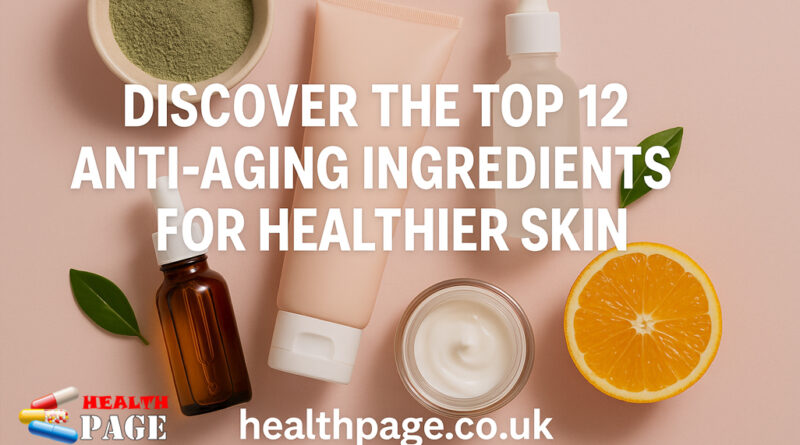Discover the Top 12 Anti-Aging Ingredients for Healthier Skin
Broadly speaking, aging can be define as the time-dependent deterioration of physiological functions necessary for survival and reproduction, a process that most people would like to slow down. The main causes of aging include cell damage caused by the accumulation of free radicals and the shortening of telomeres , structures located at the ends of chromosomes that play an important role in cell division.
Although aging is inevitable, extending human lifespan and slowing down the aging process has been the focus of scientific research for decades. Through this research, scientists have discovered many substances with anti-aging properties. Anti-aging can be achieve through many medical means, but most people hope to seek natural ways to slow down the aging process and prevent age-related diseases.
The following ingredients have clear anti-aging effects and are available in finish products for sale. But current research results show that they are not limited to the following ingredients, and many other ingredients also have anti-aging effects.
1. Curcumin
Curcumin, the main active ingredient in turmeric, has been show to have powerful anti-aging properties. Which are attribute to its strong antioxidant potential. Cells become senescent when they stop dividing. As we age, senescent cells accumulate, which can accelerate aging and disease progression. Studies have shown that curcumin activates certain proteins, including sirtuins and AMP-activated protein kinase (AMPK), which can delay cellular aging and extend lifespan. In addition, studies have shown that curcumin can resist cell damage and significantly extend the lifespan of fruit flies, roundworms, and mice. Curcumin can also delay age-related diseases and alleviate age-related symptoms. This may be why consuming turmeric can reduce the risk of age-related mental decline in humans. You can use turmeric in your diet or take a curcumin supplement to increase your curcumin intake.
2. EGCG
EGCG is a polyphenol compound concentrate in green tea that may reduce the risk of certain cancers and other health conditions. Such as heart disease. One of the many potential health-promoting properties of EGCG is its ability to promote longevity and prevent the development of age-related diseases. EGCG may slow aging by restoring mitochondrial function in cells and acting on pathways associated with aging, including the AMP-activated protein kinase signaling pathway. It also induces autophagy, the process by which the body clears damaged cellular material. Green tea intake has been link to a lower risk of all-cause mortality, diabetes, stroke, and death related to heart disease. Additionally, animal studies have shown that it may protect the skin from the effects of ultraviolet (UV) light-induced skin aging and wrinkling. EGCG can be supplement by drinking green tea or taking concentrated supplements.
3. Collagen
Collagen has gained widespread attention among young people for its potential to reduce skin aging. It is an integral component of the skin and helps maintain its structure. As we age, collagen production slows, leading to a loss of collagen in the skin, which can accelerate signs of aging such as wrinkles. For example, a 2019 study of 72 women showed that taking a supplement containing 2.5 grams of collagen daily, along with several other ingredients, including biotin, for 12 weeks significantly improved skin hydration, roughness, and elasticity.
Another study of 114 women found that eight weeks of treatment with 2.5 grams of collagen peptides significantly reduced eye wrinkles and increased collagen levels in the skin. While these findings are promising, many collagen studies are funded by companies that produce collagen products, which may affect the results. There are many types of collagen supplements on the market, including powders and capsules.
4. Coenzyme Q10
Coenzyme Q10 (CoQ10) is an antioxidant produce by the body. It plays a vital role in energy production and protects against cellular damage. Research shows that levels of CoQ10 decline as we age and that supplementing with CoQ10 may improve certain health conditions in older adults. For example, one study of 443 older adults showed that supplementing with CoQ10 and selenium over a 4-year period improved their overall quality of life, reduced doctor visits, and slowed deterioration in physical and mental performance. CoQ10 supplementation helps reduce oxidative stress, a characteristic accumulation of free radicals and other reactive molecules that can accelerate the aging process and the onset of age-related diseases. Although CoQ10 shows promise as an anti-aging supplement, more evidence is need before it can be recommend as a natural way to slow aging. Always consult a trusted healthcare professional before trying it.
5. Nicotinamide Riboside and Nicotinamide Mononucleotide
Nicotinamide riboside (NR) and nicotinamide mononucleotide (NMN) are precursors of nicotinamide adenine dinucleotide (NAD+).
NAD+ is a compound found in every cell in the body where it is involve in many critical processes, including energy metabolism, DNA repair, and gene expression. NAD+ levels decline with age, and this decline is thought to be associate with accelerate physical decline and the onset of age-related diseases such as Alzheimer’s disease. Animal studies have shown that supplementation with the NAD+ precursors NMN and NR may restore NAD+ levels and prevent age-related physical decline. For example, one study in aging mice showed that oral administration of NMN prevented age-related genetic changes and improved energy metabolism, physical activity, and insulin sensitivity. Other animal studies have also shown positive results related to supplementation with NR and NMN. However, more human studies are need before strong conclusions can be draw about the anti-aging effects of NR and NMN.
6. Saffron
Saffron is a yellow carotenoid pigment found in saffron, a popular, expensive spice commonly use in Indian and Spanish cuisines. Human and animal studies have shown that saffron has many health benefits, including anti-cancer, anti-inflammatory, anti-anxiety, and anti-diabetic effects. In addition to the properties listed above, saffron has the potential to fight aging and prevent age-related mental decline. Test-tube and rodent studies have shown that saffron helps prevent age-related neurological damage by inhibiting the production of advanced glycation end products (AGEs) and reactive oxygen species (ROS), which are compounds that contribute to aging. Saffron has also been show to help prevent aging of human skin cells by reducing inflammation and protecting against UV-induced cell damage. Given that saffron is the world’s most expensive spice, a more cost-effective way to increase your intake of concentrated saffron is to take a concentrated saffron supplement.
In addition to those listed above, the following supplements also have strong anti-aging potential:
7. Theanine .
L-theanine is an amino acid concentrated in some teas, including green tea. It may help prevent mental weakness and has been shown to extend the lifespan of roundworms by approximately 5%.
8. Rhodiola rosea
This medicinal plant has potent anti-inflammatory and anti-aging properties. A study on fruit flies showed that the average lifespan of the group treated with Rhodiola rosea powder increased by 17%.
9. Garlic
Garlic has powerful anti-inflammatory and antioxidant properties. Test-tube and rodent studies show that garlic supplementation may protect against UV-induced skin aging and wrinkling.
10. Astragalus
Astragalus is a stress-reducing herb used in traditional Chinese medicine. It may help fight aging by reducing oxidative stress, boosting immune function, and preventing cell damage.
11. Fisetin
Fisetin is a flavonoid that is a therapeutic drug that kills senescent cells. Rodent studies have shown that it may reduce the number of senescent cells in tissues and extend lifespan.
12. Resveratrol
Resveratrol is a polyphenol found in grapes, berries, peanuts, and red wine that may extend lifespan by activating certain genes called sirtuins. Pilot studies have shown it can extend lifespan in fruit flies, yeast, and nematodes. While these results are promising, more research in humans is needed to fully understand how these supplements can be used to extend lifespan.



Pingback: Skin Tag ICD 10: Complete Guide for Health Professionals